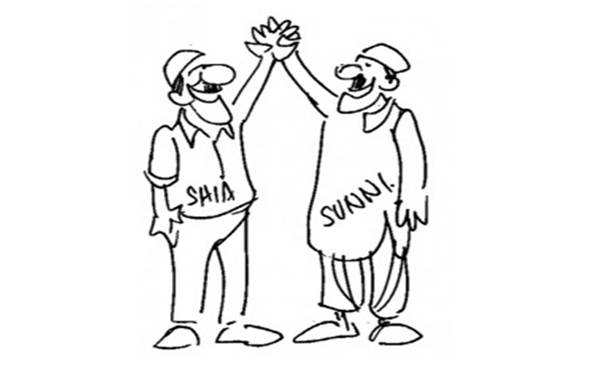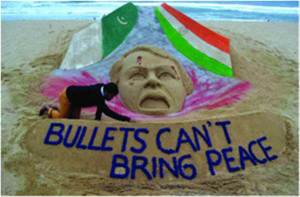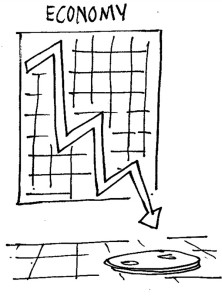
Unity
Sir,
We regularly hear how the Shia-Sunni split finds its roots in the early years of Islam, and how this rift continues to play out in what is happening in the Middle East. Too often our TV screen are full of all that created rift, but seldom do we ever see or hear what can bring us together as one people. When you get to the depth of the matter, the things that perhaps divide Shias and Sunnis are very few compared to all that unites us. Our faith, our beliefs, the crux of our practices, even our theological sources are more or the less similar. Why is it then that we refuse to bury the past and start fresh.
Perhaps there are academics and intellectuals that can shed light on the matter and prescribe a way forward. But the fact remains, we Muslims need to come together. The sooner the better. Millions have lost their lives over the centuries, just because they did not belong to someone else’s sect. Surely we can understand the folly of our differences and prevent millions more losing their lives as this drama continues to unfold. Our leaders, religious and otherwise, need to come together and preach love instead of hatred, unity instead of division, tolerance instead of extremism. Not only would this help resolve so many conflicts playing out in the world right now, but also benefit us in Pakistan as a nation.
Asad Amir,
Lahore.

Brain fog
Sir,
Brain fog, also commonly known as brain fatigue, can be defined as mild to severe mental confusion. When this happens, it is common to experience a lack of focus, poor memory recall and reduced mental activity. Some common causes of brain fog are lack of deep sleep, mental stress (professional or personal), diabetes, and nutritional deficiencies in an improper diet. Occupations that require an individual to work long hours or stay up overnight can lead to brain fog as well.
The people who work in shifts at mills, factories, hospitals or other such places must be careful about getting proper sleep and rest. It is often observed that many people perform night shift duties and without sleep and taking rest they continue to work another job during the day. This is dangerous for one’s health because disrupted sleep is a significant contributor to fatigue. If the causes of brain fog are not addressed, then the condition can continue to occur to the point that it can negatively affect one’s professional and personal life.
To solve this problem, each individual has to find personal solutions. Experiments with diet to see if any specific foods or food additives are to blame could be useful. Introducing plenty of healthy fats into a diet — nuts, olive oil, coconut oil, avocado, and fatty fish — since they are important nutritional building blocks for a healthy brain can also be advantageous. Exercise increases the flow of blood, oxygen, and nutrients to brain and can sharpen the brain in minutes.
Mansoor Ahmed,
Faisalabad.
High-rises
Sir,
For the last few decades, the skyline of the metropolis has been constantly vandalized by the builders’ mafia; the area that has been the worst-affected by the mafia’s greedy mischief is Bath Island. Once a serene and peaceful lush green enclave, mostly occupied by the Parsi community and government quarters, has now been turned into a jungle of concrete and steel.
Unfortunately, bath island is fast being populated by high-rise apartments of different sizes, some as large as 13/14 stories. On the contrary, as per KDA’s master plan, no building could be raised on the island beyond the ground plus three. Sadly, with the result of no-hold barred commercialization in the area, old age civic enmities like waster, sewerage, garbage disposal and electricity provided to residents of Bath Island have been completely destroyed.
Recently, an old bungalow opposite the Supreme Court Rest House, which is adjacent to Punjab House and at walking distance of the Staff Flag House, where judges of the apex court stay during their sojourn to Karachi, has been knocked down.
From the fast track work-in-progress carried out on the site, it is evident that one more eye-sore i.e. high- rise building is planned on the location. However, keeping in view the importance and high security risk area, the Sindh CM is requested to direct the Sindh Provincial Building Authority to ensure that the KDA master plan is strictly followed in this case. Besides, the honourable Supreme Court of Pakistan may also take cognizance, as in case, if the construction of this high-rise building is allowed, not only privacy but the security of the judges would be at high risk.
Altamash,
Karachi.
Irony
Sir,
Recently, Sindh Chief Minister Murad Ali Shah visited the Karsaz monument to pay homage to those killed in the twin blasts. He also announced to re-investigate the Oct 18, 2007 Karsaz incident that claimed the lives of around 200 people.
He stated, “As we all know, it was the most tragic incident in the country`s history, but despite the bloodshed and the intensity of the incident, all evidence and proofs were removed from the crime scene within a few hours. The case was never pursued and the brutal attack remained unsolved. So, we have decided to investigate the case to provide justice to the victims and their families.”
Murad Ali Shah, we never expected this type of statement from you. As CM you must ask your leadership what it had done when they were in the federal and provincial governments from 2008-2013 instead of forming an investigating team now.
Mubashir Mahmood,
Karachi.
Tainted meat
Sir,
It is disillusioning to see that meat vendors in Pakistan have no compunctions about exploiting consumers by selling haraam meat. On a recent inspection, the food authorities discovered that a number of vendors had mixed pork or horsemeat with mutton and beef. This is tantamount to playing with consumers’ health, given that pork and horsemeat are considered unlawful in Islam. Moreover, the practice clearly violates Islamic rulings, which call for justice and fairness in business dealings and, in this case, require that traders and vendors should supply fresh, halaal and hygienic edibles to consumers.
The government should adopt a stringent mechanism to rectify this anomaly, for example, by sealing off such shops and heavily fining and/or arresting vendors found to be selling such meat to their customers.
Aiyza Javaid,
Lahore.

Muslim solution
Sir,
The current global environment of distrust of the Muslim world is not merely due to the violence and terrorism associated with Muslims. There are a number of reasons for this, which the Muslim community should examine and address.
First and foremost, Muslims should recognize that an interpretation of Islam that is more human rights-friendly is closer to modern thought and democracy than other faiths. Second, as long as Sunni Saudi Arabia and Shia Iran continue to oppose each other, neither will be capable of providing leadership or unity to the Muslim world. Thus, Muslims should consider looking to other countries to play this role. Here, Palestine could serve as a key bond. The Palestinians’ long history of repression by Israel commands respect and sympathy among Muslims across the world. More important are US interests in the region. As the world’s predominant economic and military power and with a vested interest in Israel’s wellbeing, the US has reason to want a solution to the Palestine and Syria crises. If the Palestine solution could be framed in conjunction with the Syrian solution, this would help resolve other problems being faced by Muslims in other parts of the world. For this, they must persuade the Palestinians to agree to such a solution through UNPKF and MESI.
After so much bloodshed and suffering, the Arab Spring should not be allowed to fail. With wide powers given to the UN Election Commission during the elections in Syria, the Muslim community should persuade the US not to give up when success is so close. The UN should be asked to make provision for volunteers from UN-registered human rights NGOs, who will likely come in large numbers from South Asia and the Southeast Muslim countries, to help bring peace and stability to Syria. This would also reduce the financial burden on UN peacekeeping programs in Syria and later in the rest of the Middle East. The Muslim world will also have to motivate the Palestinians to agree to a one-state solution with suitable modifications in their interest. Many Palestinians are now inclined to reject propaganda from Israel and the West in favor of a two-state solution. A useful measure could be to launch a registered lobbying forum in the US for interested people to lobby for the Palestinian cause.
Hem Raj Jain,
Jefferson City, MO.

Neighbours
Sir,
India and Pakistan share a history of hostile relations since their independence in 1947. The countries have never been on good terms and apparently don’t seem like they will get along moving forward. Obviously, the Kashmir dispute is the legacy of an incomplete division. If Britain had divided the subcontinent justly, the world would not fear a nuclear war in South Asia. According to the partition plan, the fate of over 550 princely states was left to the geographical location and wishes of the people. The State of Jammu and Kashmir should have acceded to Pakistan because of its geographical location and Muslim majority population. The instrument of accession signed by Maharaja Hari Singh of Kashmir with India did not reflect the true will of the people. It is cited in history that tribal Pakistanis raided Kashmir, and in response Maharaja Hari Singh asked for help from the Indian government, but this is an engineered and fake version of the past. In fact, Indian forces landed in Kashmir first and retaliation from indigenous Kashmiris came later, which was rightly supported by Pakistan.
Recent developments in India and Pakistan are once again threatening regional peace and stability, and the possibilities of a nuclear war in the region are being discussed in the international media. With Modi as India’s Prime Minister, the threats are greater for Pakistan. Modi’s ambitions are inviting Pakistan to a war, but economically Pakistan is not in a position to afford another war. Indian violations of the Line and Control, hate speeches against Pakistan, media campaigns and strong diplomacy, are all parts of their preplanned strategy. Pakistan’s nuclear power is its best bulwark; otherwise Modi Sarkar is in full mood to start a bloody adventure. Modi is hailed in India as the leader of pure Hindutva. He had and still has the support of hard-core Hindu extremist parties like RSS (Rashtriya Swayamsevak Sangh), which helped him grab the prime minister’s seat. Allegedly involved in the massacre of two thousand Muslims in Gujrat, Modi’s antagonism to Islam and Pakistan is not a new phenomenon, but his presence in the PM office is encouraging Indian hard-line parties and other members of parliament to engage in a war of words with Pakistan.
The issue of Kashmir will remain an ignition point for a nuclear war in the region. India needs to understand this better than Pakistan. As long as the Kashmiris are not given the right of plebiscite, Pakistan will extend its moral support to them. Pakistan needs powerful diplomacy to counter Indian lobbying, but sadly the Ministry of Foreign Affairs does not have a minister. Apparently, the army chief himself is doing the role of foreign affairs minister on behalf of the government.
Altaf Ahmad,
Lahore.

Decline
Sir,
An alarming news was reported in your newspaper that for the first quarter of the current fiscal year (2016-17), home remittances dropped by 5.4% as compared to the first quarter of fiscal year 2015-16. Home remittances in July-September 2016 amounted to $4.69 billion compared to $4.957 billion in July-September 2015. In other words, home remittances shrank by around two hundred and sixty-seven million dollars for July-Sept 2016 year-on-year. If this much fall in home remittances continues in the forthcoming remaining nine months of this fiscal year, it would mean around $1 billion will be wiped out from home remittances for fiscal year 2016-17. This is a lot of money for Pakistan, which is heavily dependent on home remittances to support its external account. Pakistan has a heavy trade deficit due to increasing imports and falling exports. The trade deficit swelled to $7 billion during July-September 2016. We consume more than we produce. Surprisingly, it seems the country’s economic managers are not really bothered by the issue. When home remittances fell by a whopping 20% in July 2016 as compared to July 2015, I thought this would ring alarm bells for the country’s economic managers, including the State Bank of Pakistan, but we did not see any media reports about any efforts launched by them to find out the reasons for such a steep fall in home remittances for July 2016. Now the latest data shows that home remittances for September 2016 fell by 9.3% as compared to September 2015. This is a very serious matter and needs the urgent attention of the country’s finance minister and State Bank of Pakistan to launch a professional inquiry to find out reasons causing the fall in home remittances and to seek possible solutions to stop this undesirable trend. Some observers have attributed the drop in our home remittances to the Gulf economies, which are slowing down owing to reduction in the crude oil price and thus resulting in thousands of job losses of expatriates, including Pakistanis. I believe this is not the only reason for our shrinking home remittances because crude oil prices, which have more than halved from their peak since the year 2014, are still hovering in the range of $40-to-$50 a barrel. But we did not see the decrease in our home remittances during the last two fiscal years. On the contrary, home remittances for the last two fiscal years increased. It is noteworthy that our remittances from the United States and United Kingdom also fell during July-September 2016, whereas these economies are doing well and are not dependent on high oil prices. So, what are the reasons that caused the drop of 5.4% in home remittances? I believe one main reason for the fall is the slump in the Pakistan real estate market since May 2016 to date. We all know that almost every overseas Pakistani has a dream to own a house in Pakistan. In order to fulfill this dream, overseas Pakistanis send lots of money to buy property with in Pakistan. But now that the government of Pakistan has imposed astronomical taxes on property, overseas Pakistanis have shied away from buying property in Pakistan. There is a clear and strong link between a stable real estate market and home remittances.
Ejaz Ahmad,
Lahore.

